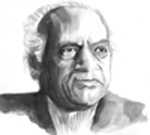Faiz Ahmed Faiz left an enduring legacy for lovers of Urdu poetry
Mukul Bansal
Tribune News Service
Chandigarh, March 5
Faiz Ahmed Faiz (1911-1984), whose 108th birth anniversary fell last month, is regarded as the greatest Pakistani Urdu poet of the 20th century. He was a committed leftist poet and author. His popularity in the Urdu world and beyond was next only to the legendary Muhammad Iqbal and he became a legend in his lifetime.
Among other honours, Faiz was nominated for the Nobel Prize in Literature and won the Lenin Peace Prize.
Interestingly, Faiz mentored another legendary Urdu poet of Pakistan, Ahmed Faraz (1931-2008). Both lived together in London in self-imposed exile during General Zia’s totalitarian regime.
They had served spells in prison in their country for writing revolutionary poetry, decrying tyranny, calling for justice, and in Faiz’s case, for his strong communist outlook, trade unionism and cultural leanings.
It’s another matter that both the poets also wrote soulful, some of the most exquisite romantic poetry of modern times, which has become an enduring legacy for lovers of Urdu poetry.
Faiz’s use of exalted language, diction and context, his thoughts and emotions are sometimes difficult to understand, especially for modern readers, but lovers of his poetry keep reference books handy and delight in his shayari.
Once I heard a couplet by Faiz, rather simple in language, but it made me double up in delight at its masterly expression and ironical tone: Wo baat saare fasane mein jiska zjikr na tha, wo baat unko bari naagvar guzri hai. The couplet symbolised Pakistan military establishment’s dictatorship and its repressive policies.
Faiz studied philosophy and English literature at Lahore besides doing his MA in Arabic. He started his career as a junior lecturer in an Amritsar college. It was 1934-35 and Left-wing thought was coming into its own. The Communist Party of India had been founded in 1925. The young Faiz read voraciously and composed poetry.
According to a commentator, the struggle against poverty and the fight against the forces of capitalism gave Faiz’s poetry a sense of direction. His first verse collection, Naqsh-e-Fariyadi (The Lamenting Image), was published in 1942. It was instantly lapped up by lovers of Urdu poetry in India and abroad. It had the legendary nazm, Bol...an exhortation to the exploited classes to speak up against zulm and injustice:
Bol ke lab (lips) azad hain tere, bol zaban ab tak teri hai/tera sutwan (well-built) jism hai tera, bol ke jaan ab tak teri hai/Dekh ke ahangar ki (ironsmith) dukaan mein tund (bright) hain shole, surkh (red) hai aahn (iron)/Khulne lage kuflon ke dahane (opening of locks), phaila har ek zanjeer ka daman/Bol, ye thoda waqt bahut hai, jism-o-zabaan ki maut se pehle/Bol, jo kuchh kehna hai kehle.
One of the famous ghazals in this collection has three of the oft-quoted couplets:
Dono jahan teri mohabbat mein haar ke/Wo ja raha hai (reference to the funeral procession) koi shab-e-gham (night of sorrow, that is life) guzaar ke.
Ik fursate (freedom) gunah mili, wo bhi chaar din/Dekhe hain humne hausle (courage) Parvardigar (God) ke.
Duniya ne teri yaad se begana (alienate) kar diya, tujhse bhi dil-fareb (heart-alluring) hain gham rozgar ke.
In the collection of his poetry, Dast-e-Tahe-Sang (Hand under the rock), a couplet, which is actually a dirge for proud lovers, shows why Faiz was a great poet: Na raha, junoone-e-rukhe-wafa (madness to be faithful in love), ye rasan (stake and noose), ye daar (gallows) karoge kya/Jinhe zurm-e-ishq pe naaz tha, wo gunahgaar chale gaye.
Faiz was an admirer of music composer Anil Biswas’ compositions from pre-Independence days. Faiz had once written a kita (a quartet) for Biswas: Harek harf-e-tamanna (word of desire) is izterrar (eagerness) mein hai/ke phir naseeb ho (mile) darbaar-e-yaare-banda-nawaz (the court of the beloved master musician), har ik ghazal ka safeena (boat) is intezaar mein hai, ke aaye misl-e-saba (like the wind) phir Aneel (Anil Biswas, Anil also means wind) ki tarah.
It’s interesting to note that when Faiz sought admission to Government College, Lahore, (Aye roshnion ke shehar...O city of lights--Faiz) around 1927, after finishing high school from Murray College, Sialkot, (though he had been a brilliant student throughout), it was Allama Iqbal who, according to Faiz’s eldest grandson and authorised biographer, Ali Madeeh Hashmi, gave him a letter of introduction to the principal, as the college was known for its high academic standards.
Faiz’s heart and mind were shaken when the progressive movement started in 1936 under Munshi Premchand and Sajjad Jaheer. He was intensely affected by the Great Depression of 1929 and the farmers’ and labourers’ movements and expressed his anguish in Nizami’s Persian declaration: Ab mein dil bechta hoon aur jaan kharidta hoon.
Faiz, like a multitude of sensitive minds, was disillusioned in the aftermath of Partition and developments that took place in Pakistan but there were lakhs in India too who admired Faiz’s following nazm, Subah-e-azadi (Dawn of independence) for similar reasons:
Ye daagh daagh ujala, ye shab gazeeda seher
Wo intezaar tha jiska ye wo seher to nahi
Ye wo seher to nahi, jis ki arzu le kar
Chaley thay yaar ke mil jaye gi kahin na kahin
Falak ke dasht mein taaron ki aakhri ki manzil
Kahin to hoga shab-e-sust mauj ka saahil
Kahin to ja ke rukay ga safeena-e-gham-e dil.
The English translation by Ali Madeeh Hashmi:
This stained light, this night-bitten dawn;
This is not that long-awaited daybreak;
This is not the dawn in whose longing,
We set out believing we would find, somewhere,
in heaven’s wide void,
The stars’ final resting place;
Somewhere the shore of night’s slow-washing tide;
Somewhere, an anchor for the ship of heartache.









